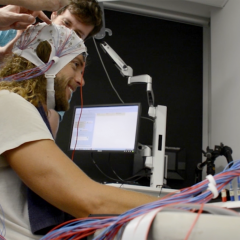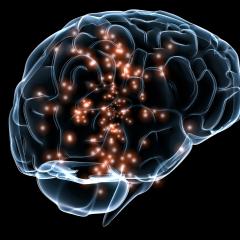Zapping your brain can make you more creative

Scientists have discovered that applying mild electric currents to the brain can actually cause you to think more creatively.
Your brain uses minute electric currents to communicate between neurons. These electric currents occur in waves throughout the brain. These waves can be measured by placing electrodes on your scalp.
As your brain does different things, your brain waves change – the number of waves each second (called oscillations) varies from less than one per second up to several hundred per second.
Very slow waves, called delta waves (which occur at a few oscillations per second or less) occur when you are in deep sleep. Faster waves called alpha waves (around 10 per second), are associated with relaxation, day-dreaming and creativity. Beta waves (up to about 35 per second) and gamma waves (35 and above) occur when you are concentrating.
Applying mild electric currents to the brain
Now, scientists have discovered that applying mild electric currents to the brain at the same speed as alpha waves can actually cause you to think more creatively. When the same currents are applied at gamma speed, creativity doesn’t improve.
This is an astonishing result, because it means that it is not just the electric current that causes the increase in creativity. It is the electric current at the correct oscillation speed.
It also means that alpha waves are not just a side-effect of relaxed, creative thinking – instead, alpha waves somehow actually cause your brain to be creative.
Neuroscientists often debate whether brain oscillations do anything important. Evidence and ideas have been emerging for many years that oscillations are intimately involved in brain function. This latest study is another strong piece of evidence that supports these ideas.
Here is the scientific summary of the research: Functional role of frontal alpha oscillations in creativity.


